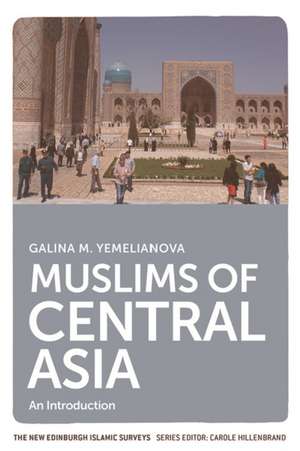Muslims of Central Asia: The New Edinburgh Islamic Surveys
Autor Galina M Yemelianovaen Limba Engleză Paperback – 22 ian 2019
These special characteristics of Central Asian Islam ensured its survival during seventy years of Soviet atheist rule, while in the post-Soviet period Islam has been integrated into nation-building projects in constitutionally secular Uzbekistan, Kazakhstan, Tajikistan, Kyrgyzstan and Turkmenistan.
This absorbing history is traced in this fascinating study which shows how, from the seventh century to the present day, the region's people have negotiated their distinctively Central Asian Islamic identity in the face of enduring external Islamic and non-Islamic dominations, ethnic nationalisms and, more recently, global transnational Islamic influences.
| Toate formatele și edițiile | Preț | Express |
|---|---|---|
| Paperback (1) | 185.47 lei 3-5 săpt. | |
| EDINBURGH UNIVERSITY PRESS – 22 ian 2019 | 185.47 lei 3-5 săpt. | |
| Hardback (1) | 613.48 lei 6-8 săpt. | |
| EDINBURGH UNIVERSITY PRESS – 3 ian 2019 | 613.48 lei 6-8 săpt. |
Din seria The New Edinburgh Islamic Surveys
- 10%
 Preț: 196.29 lei
Preț: 196.29 lei - 11%
 Preț: 184.14 lei
Preț: 184.14 lei - 11%
 Preț: 184.59 lei
Preț: 184.59 lei - 10%
 Preț: 185.93 lei
Preț: 185.93 lei - 10%
 Preț: 188.20 lei
Preț: 188.20 lei - 10%
 Preț: 191.67 lei
Preț: 191.67 lei - 11%
 Preț: 191.38 lei
Preț: 191.38 lei - 9%
 Preț: 197.70 lei
Preț: 197.70 lei - 10%
 Preț: 194.37 lei
Preț: 194.37 lei - 18%
 Preț: 643.86 lei
Preț: 643.86 lei - 18%
 Preț: 615.57 lei
Preț: 615.57 lei - 11%
 Preț: 190.75 lei
Preț: 190.75 lei - 18%
 Preț: 645.73 lei
Preț: 645.73 lei - 10%
 Preț: 192.22 lei
Preț: 192.22 lei - 18%
 Preț: 641.74 lei
Preț: 641.74 lei - 18%
 Preț: 642.50 lei
Preț: 642.50 lei - 17%
 Preț: 650.21 lei
Preț: 650.21 lei - 18%
 Preț: 636.48 lei
Preț: 636.48 lei -
 Preț: 134.60 lei
Preț: 134.60 lei
Preț: 185.47 lei
Preț vechi: 207.27 lei
-11% Nou
Puncte Express: 278
Preț estimativ în valută:
35.49€ • 38.54$ • 29.81£
35.49€ • 38.54$ • 29.81£
Carte disponibilă
Livrare economică 01-15 aprilie
Preluare comenzi: 021 569.72.76
Specificații
ISBN-13: 9781474416337
ISBN-10: 1474416330
Pagini: 240
Dimensiuni: 155 x 231 x 15 mm
Greutate: 0.36 kg
Editura: EDINBURGH UNIVERSITY PRESS
Seria The New Edinburgh Islamic Surveys
ISBN-10: 1474416330
Pagini: 240
Dimensiuni: 155 x 231 x 15 mm
Greutate: 0.36 kg
Editura: EDINBURGH UNIVERSITY PRESS
Seria The New Edinburgh Islamic Surveys
Descriere
This fascinating study which shows how, from the seventh century to the present day, the region's people have negotiated their distinctively Central Asian Islamic identity in the face of enduring external Islamic and non-Islamic dominations, ethnic nationalisms and, more recently, global transnational Islamic influences.
